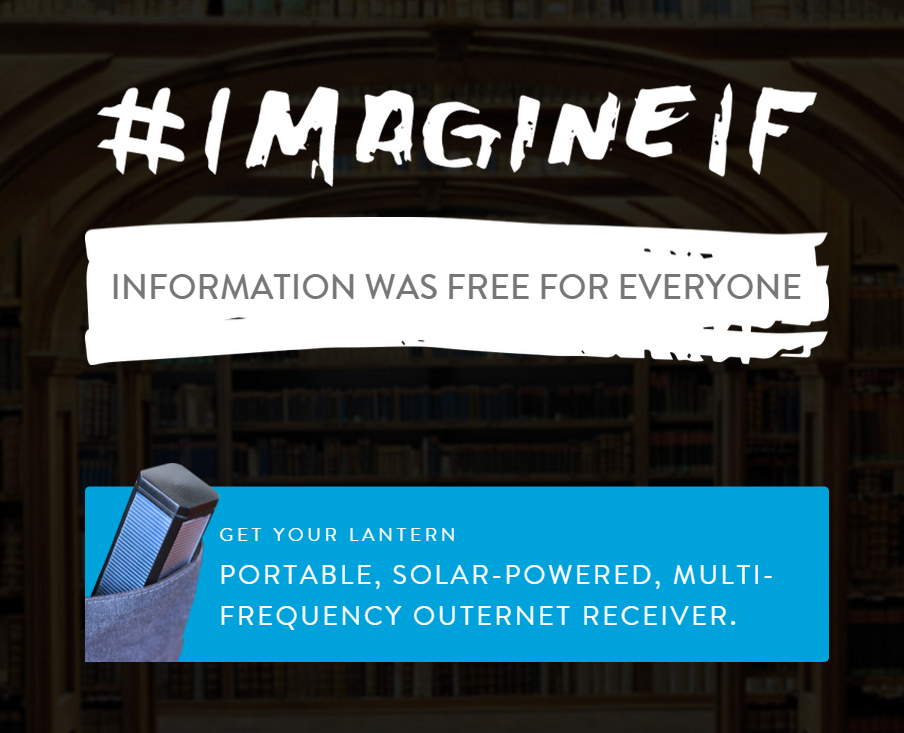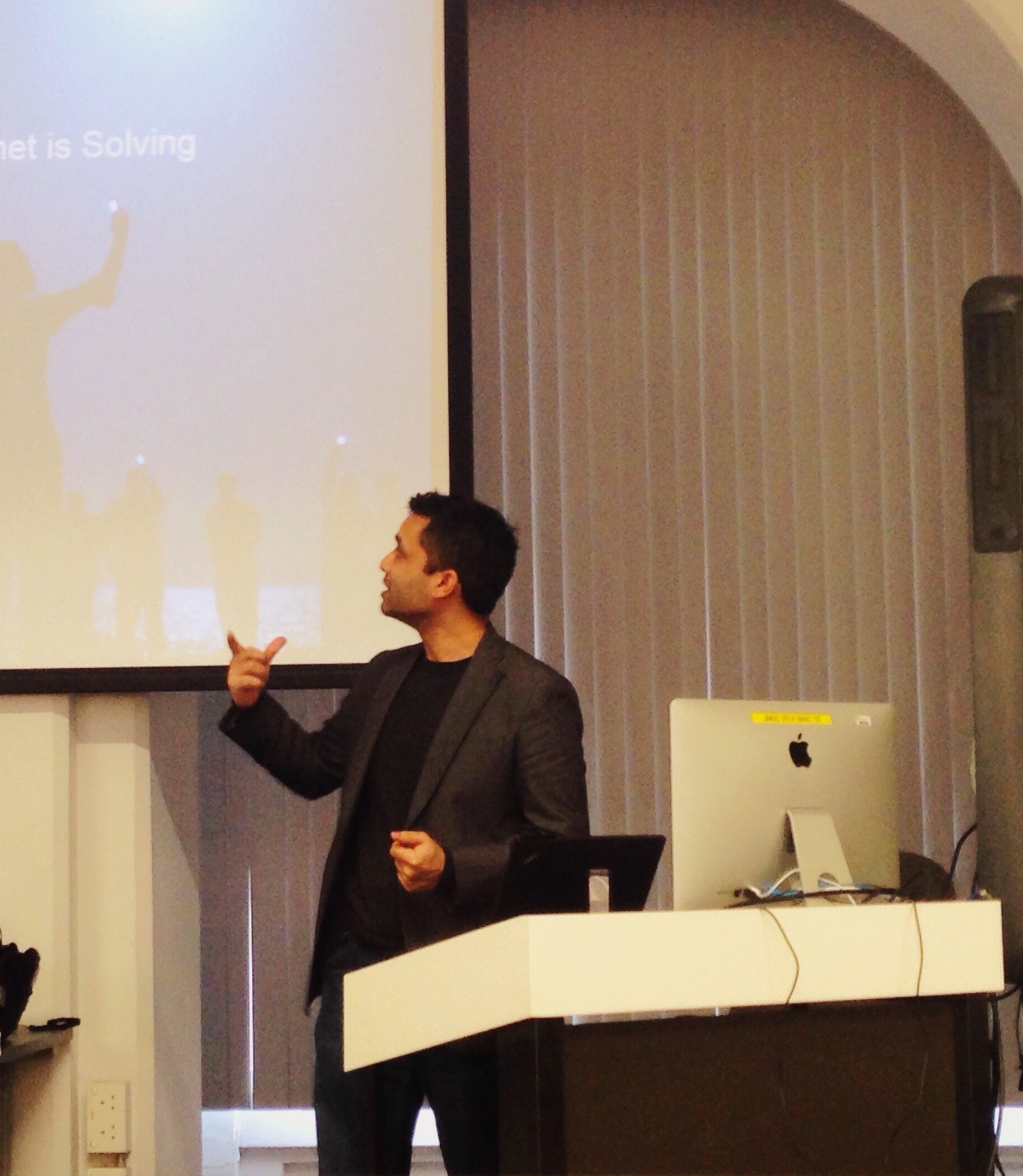by Nayantara Bhat | Photo credits: Outernet, Nayantara Bhat | 16 February 2015
“Imagine if: Information was free for everyone” says the homepage of Outernet — a service that is changing the way the Internet is accessed around the world. Using a satellite receiver and a tuner, users in Africa, North America and Europe can now access Outernet’s content, and founder Syed Karim hopes to take it further with a mobile service set for a hopeful release in July.

What is it?
The simplest way to describe Outernet is to call it a global data broadcasting system. In a recent talk held at The University of Hong Kong, Karim said the advantage of the system is that the broadcast goes from “one to many and hence one to infinite.”
It provides offline versions of Internet content such as Wikipedia pages and Project Gutenberg e-books, and hopes in the future to be providing apps and even operating systems. The content is decided partially by way of public opinion and partially through a careful and strict selection process.
Satellite transmission restricts the bandwidth for data transmission, and so the creators of Outernet have to choose carefully when deciding which content they want to provide. Part of the material provided by Outernet will be requested by users and included by popular vote. There will also be a certain percentage of sponsored content.
The user-requested content works on an adjusted voting system — users must sign up to cast a vote, and to keep things fair for people who have limited access to the Internet (i.e. the people who need Outernet), there’s a quota on the number of votes one person can cast. Incidentally, this feedback system is the only way Outernet can understand the reach of the project. As Karim explained, satellite connection “ensures the anonymity of consumption”, and circumvents government regulations on transmitters, providing a safe (for now, at least) way to access information.
How does it work?
According to Outernet’s website, the creators are currently working on a receiver build that is based on Raspberry Pi — a Linux-running single-board computer the size of a credit card that is armed with one or two USB ports and an ARM processor. Raspberry Pi has become increasingly prevalent recently, especially amongst small-scale developers due to its somewhat limited specifications — which makes it perfect for Outernet’s purpose, as it’s not only portable and cheap but consumes less power as compared to a conventional computer. (Note: Raspberry Pi 2 is set to run Windows 10 with more RAM while still selling at an affordable rate.)

Syed Karim talking about Outernet’s new project, Lantern, at HKU’s Eliot Hall. Stay tuned for our coverage on Lantern.
Users of the service will need a DVB-S satellite dish, a low-noise block downconverter (LNB), and a receiver that is compatible with Linux. The company is currently selling USB tuners in its store, and is planning to sell fully assembled receivers in the near future, eliminating the middleman and keeping things affordable for consumers. In much the same way that satellite television works, satellites will broadcast Outernet’s content for the viewing pleasure of anyone with the appropriate hardware and software. As Karim explained during the talk, the receiver will work like a Wi-Fi router — broadcasting signal to everyone in range. “All you need is a browser,” said Karim.
Satellite Internet is not a new concept; it’s been around since the early 1990s. Although it comes in very useful for accessing Internet from rural locations, it can be extremely frustrating due to the extended ping time, and low capacity for bandwidth-heavy transmissions. However, what Outernet is proposing is not an Internet connection but an archive of information transmitted through space, more like a directory or an encyclopaedia than a live all-access internet connection. The core difference between the Internet and Outernet is that an internet connection is bidirectional — that is, a device both sends and receives data. In the case of Outernet’s receivers, they will be able to receive data from satellites but unable to transmit anything in return.
Why is it important?
Offline content may not seem like the most important thing to those who are privileged enough to have 24/7 access to the web. However, the motivation behind the inception of Outernet is based on some shocking statistics regarding those who aren’t so lucky. While Africa makes up 15% of the world’s population, only 26.5% of Africans have access to Internet; that is, only 9.8% of the world’s Internet users are African.
With the world constantly changing in terms of globalisation and health and safety precautions, it is more important than ever for people to have access to the information they need, especially in Africa, with sub-Saharan Africa accounting for 1.2 million of the world’s HIV/AIDS cases. Information about the spread and prevention of the disease could help more than any government family planning campaign. Likewise, in countries where the government has prevented people from accessing their right to information, Outernet will provide a library like no other.
Even without the social change Outernet is putting into effect, it’s a service that fills a significant niche in the market and will change the way that the Internet is accessed. Theoretically, it will be possible to browse Wikipedia even from the summit of a mountain or the middle of the desert. Currently, the future extension of Outernet’s services is contingent on the level of funding they receive, and whether it will take off on a global scale or not. Only time will tell.
Nayantara Bhat
Latest posts by Nayantara Bhat (see all)
- From media partner to organiser: We are back at Startup Weekend HKU! - October 12, 2016
- The Quartz App: My New Favourite Thing - February 23, 2016
- Six Questions for Credit Suisse - June 19, 2015

